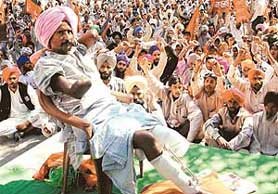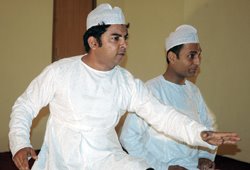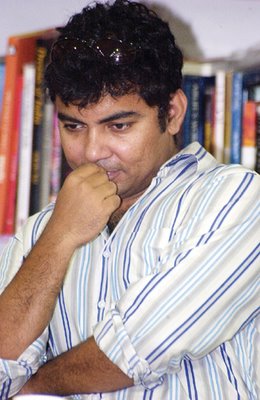


| THE REAL PAGE 3 |
 |
|
AADAB Lakhnau!
New winds of a cultural revival waft welcome changes in the city, our correspondent explores the trend
Shirin Abbas
* Another September evening at the city's elite MB Club. The crowds today have gathered to witness an ancient dying art, that of Dastan Goi, brought to the city by Delhi's Mehmud Farooqui and Danish Husain who have been invited to Lucknow by bureaucrat Zohra Chaterjee. The initial intrigue gives way to appreciation as the duo weave an enticing tale full of magic realism and visual imagery drawn purely with words, relating the amazing tale of Amir Hamza and his victories over the evil Afrasiyaab. For over two hours the magic holds the full house spell bound-glued to their chairs, as they experience the full magic of an art that has long been consigned to obscurity. The gentry comprises a fair sprinkling of the city's elite, drawn from all walks of life- former Chief Secretary AP Verma, Begum Hamida Habibullah, Zarine Viccajee and Ruddi Kapur, Pradeep and Rashmi Vaid, Meenakshi and Sudhir Pahwa, Former IPS VN Misra, Salim and Noor Khan again, to name but a few. Many have only a little understanding of chaste Urdu, much less the fair sprinkling of Persian used in the dialogue. But the linguistic obstacles do not limit their appreciation of the art...
… Just three events from one week in the life of Lucknow, but sufficient evidence to surmise that something, something very good, is slowly, silently taking shape in the City of the Nawabs. A slow but gradual conscientiousness emerging from the Lakhnavi gentry towards their cultural and literary heritage and the need for its preservation and appreciation.
Ask Noor Khan, educationist, who attended all three functions, on the trend and she avers, "Lucknow has always seen a flurry of activity take place which intensifies as the weather gets better. As for Amir Naqi Khan, I have been attending his dinners for as far back as I can remember. There has been an intensification of this of late, because I think people are realizing that they have let their past slip through in different ways and it is not only beneficial for them but for others as well to revive these traditions. But I think as far as the government is concerned, it is largely a private effort which sees such events taking place in the city. This sort of thing used to take place in Rita Sinha's time and now I must give credit to Zohra Chaterjee for taking a keen interest in reviving these traditions in Lucknow. On the other part I think publications such as the Indian Express with Tumhari Amrita and others have had a significant role in keeping these traditions alive in the city."
Speaking about her effort, Principal Secretary, Electronics and IT, Zohra Chaterjee says with a smile, "The evening of Dastan Goi made me wish sincerely that I had paid more attention to learning Urdu when my mother had insisted I learn the language. I just got through learning the bare minimal skills. I think it's the flavour of the language that holds immense attraction. I for one was overwhelmed by the public response."
Principal Secretary Handlooms & Textiles, Ravinder Singh, who was co-organiser for the event says, " We had wanted to hold a Dastan Goi session long ago but the last Dastan Goh of Lucknow died a decade back. Then Zohra chanced upon Mehmud Farooqui and Danish Husain in Delhi and we decided to call them over. The response has been terrific. We'd love to do more such events in the future."
If the exchange of SMSes between Zohra and Singh are any indication, it could well mark the beginning of a new cultural platform for more such events. Says Zohra " After the function I sent Ravinder an SMS, 'Great synergy. We must do this again sometime,' and he replied, ‘Definitely. Aadab Lucknow.' That's a nice name for a society aiming at cultural revivalism in Lucknow, she concludes." Let's just say Amen to that!






